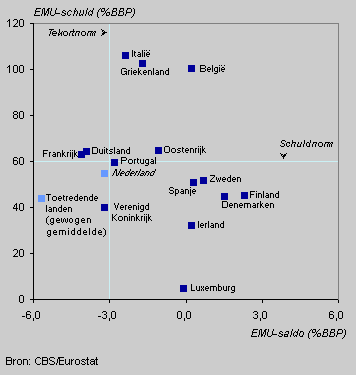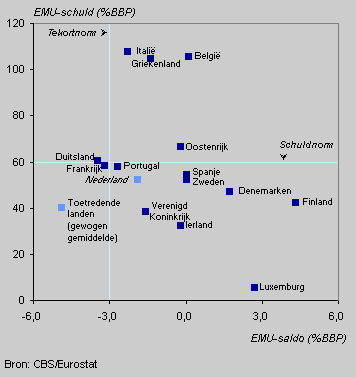Dutch EMU deficit rises to 3.2 percent

The Dutch EMU debt amounted to 54.8 percent of the gross domestic product (GDP) on 31 December 2003. This is below the EMU norm of 60 percent of GDP. The Dutch EMU deficit for 2003 was 14,4 billion euro. This is 3.2 percent of GDP and is thus above the 3 percent norm set by the EMU. This made the Netherlands a new transgressor of the EMU norms.
Highest EMU deficits in Germany and France
Together, the present fifteen countries of the European Union had an EMU deficit of 2.6 percent in 2003. This is 0.6 of a percent point higher than in 2002. The deficit was highest in Germany (3.9 percent) and France (4.1 percent). They are well in excess of the norm. The United Kingdom, too, overstepped the EMU norm with a deficit of 3.2 percent.
EMU debt and EMU deficit, 2003

Relatively large deficits for new member countries
The effect of the ten new EU countries on the level of the EMU deficit of the new European Union (EU-25) is small. Although the average EMU deficit of these countries was well above the 3 percent norm, at 5.7 percent of GDP, as their economies are so small, they will only increase the deficit of the present EU-15 by 0.1 percent to 2.7 percent.
Overstepping the debt norm
The EMU debt of the EU-25 was 63 percent of GDP in 2003. This is an increase of 1.5 percent points on 2002. The debt thus exceeds the EMU norm of 60 percent. Italy, Belgium and Greece have an EMU debt that is well above the norm, and Austria, Germany, and France also all overstepped the 60 percent mark in 2003.
EMU debt and EMU deficit, 2002

Eleven countries of the EU-25 satisfy both EMU norms
Only eleven countries of the EU-25 satisfy both EMU norms, seven of which are in the present EU-15. The seven countries with an EMU deficit below 3 percent and an EMU debt below 60 percent of GDP are Portugal, Luxembourg, Ireland, Spain, Sweden, Denmark and Finland. Of the ten accession countries Slovenia, Lithuania, Latvia and Estonia comply with the norms for the EMU debt and the EMU deficit.
In 2002, thirteen countries of the EU-25 still complied with both norms. The new transgressors are the United Kingdom and the Netherlands.
Melanie Koymans and Gerard Eding